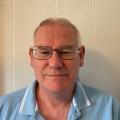
A ROYAL Air Force veteran of the Second World War has died peacefully at the Dorothy House Hospice on April 26. Des Hawkins, 97, leaves three sons.
Mr Hawkins, Flight Lieutenant Retired Bomber Command navigator, was awarded a Distinguished Flying Cross and mentioned in dispatches for his actions during WW2 in which he flew 45 missions.
He was born on November 23 1922 in Warminster. The family then moved to Melksham.
After leaving school, Des gained a place at Oxford University but the Second World War began in September 1939 and he never got to experience life as an undergraduate.
Aged just under 17, Des volunteered for the RAF. Before his service started, he worked in Trowbridge and played piano for the Stanley Murray Dance Orchestra. He continued to play the piano for most of his life.
He was called to serve in 1941. After basic training in London and Scarborough, he was sent to Canada and the USA to train in air navigation.
In 1942 he returned to England and began operational training on Wellington Bombers, Manchester Bombers and then on to Lancaster Bombers.
In early 1943 Des was posted to 44 (Rhodesia) Squadron at RAF Waddington where he completed 26 operations over Germany, Italy and Czechoslovakia.
On one of these ops his aircraft had to make an emergency landing because of engine problems after being shot at.
He was then posted to 630 Squadron at RAF East Kirkby where he did three ops to Berlin over six days. This completed his first tour of duty in November of that year.
He then spent some time instructing navigators at RAF Chipping Warden as they needed experienced personnel to do this.
In January 1945 he was posted to 625 Squadron at Kelstern and Scampton where he completed 16 operations, his last being to drop food supplies over Holland.
Between 1939 and 1945, 125,000 aircrew served in RAF Bomber Command and more than 55,000 lost their lives.
For many years Des couldn't talk about his experiences but eventually he wrote a book, No Future, an accurate and astonishing description of his experiences during the war years. He described writing the book as a cathartic experience.
Des had many stories to tell of those wartime years, all quite extraordinary for a young man in his early 20s. On one occasion, during what he described as a “bumpy ride” due to his pilot taking evasive action to avoid enemy fire, his navigational instruments fell to the floor of the plane.
He bent down to retrieve them, only to hear a loud noise. A bullet had smashed through the fuselage into the instrument board in front of him and had he not been bending down he would have undoubtedly been killed.
Des's navigational skills contributed to his remarkable survival, along with the skills of his pilot, who he often mentioned.
After demob, he joined Lloyd's of London in 1947 and lived in Hornchurch, Essex. He joined the RAF Volunteer Reserve and at weekends flew Anson aeroplanes from RAF Hornchurch, a former Battle of Britain station. He retired from Lloyd's in 1982.
He spent time living in Winchester, Paignton and Newquay before returning to his childhood town of Melksham where he spent his last years.



Comments: Our rules
We want our comments to be a lively and valuable part of our community - a place where readers can debate and engage with the most important local issues. The ability to comment on our stories is a privilege, not a right, however, and that privilege may be withdrawn if it is abused or misused.
Please report any comments that break our rules.
Read the rules here